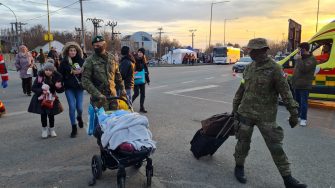
As war rages in Ukraine, UNSW’s Andrew & Renata Kaldor Centre for International Refugee Law is bringing insight and context to Europe’s extraordinary response to the millions of civilians fleeing their now-threatened homes.
Europe and other countries are taking unusually quick action, Honorary Professor Guy S Goodwin-Gill has been a leading voice on refugee issues since the first edition of his book, The Refugee in International Law, now in its Fourth Edition, co-authored by Jane McAdam with Emma Dunlop.
Professor Goodwin-Gill explains what is working for Ukraine’s refugees and why. In audio and text, he answers such questions as: What role is international law playing in responses on the ground? Why is the welcome of Ukrainians so different than the reaction to other people seeking asylum in Europe? What is the European Union’s Temporary Protection Directive and how does it work? And, what implications might this have on the future for refugee law?
Dr Claire Higgins, a Senior Research Fellow at the Kaldor Centre, explains humanitarian corridors, Europe’s different approach to temporary protection and Australia’s response to Ukrainian refugees in ‘Ukraine: 3 things to know about getting refugees to safety’.
Australia has tried to keep its harsh refugee policies shrouded in secrecy over the past 20 years – by holding people seeking asylum far from the community, limiting media access to these places and sanctioning staff who speak out – but two recent books shed light on the experience of those who bear the brunt of these policies: After the Tampa, by Abbas Nazari, and Escape from Manus, by Jaivet Ealom.
Kaldor Centre affiliate and PhD candidate Natasha Yacoub interviewed both authors in a compelling hour that drew tears and applause from those gathered at the Adelaide Writers Week session ‘Dark Actions, Dark Consequences’. It is now available as a podcast.
Both writers confronted the idea that refugees choose to leave their homes. ‘You don’t have a choice,’ Nazari said, except to become cannon fodder or flee the lands your people had lived on for generations.
More damaging dehumanising language fills Australia’s narrative about refugees, Ealom said, noting a disturbing similarity to the words Myanmar uses when dealing with its Rohingya population.
He recounted seeing then Immigration Minister Scott Morrison on a loop in the detention centre, saying ‘you will spend a very, very long time here’ numerous times a day. ‘It was bleak and demoralising and a reminder of who was the boss,’ he said, despite the legal arrangements putting detainees in the jurisdiction of Papua New Guinea.
In the camps, Ealom said it would have been better not to understand English than to absorb the mockery of the guards and other emotional barbs. ‘The more you understand, the more you suffer,’ he said.
Yet his book also details an extraordinary escape that depended on the kindness of others, often strangers, at many points. ‘It was better than any episode of Prison Break,’ Yacoub said of Escape from Manus.
Both predicted a future reckoning, whether a royal commission or another forum, where Australia would apologise. ‘It’s gone beyond just border protection and become plainly inhumane,’ Nazari said, adding that it was also financially unfeasible and had ‘led to the deaths and suicides of so many people who just came out in search of a better life’.
Nazari said he’s been asked what he would say to former Prime Minister John Howard, who ordered special forces onto the MV Tampa, where Abbas was a child on board. ‘I have a helluva lot to say to John Howard, but the reality of it is this: Little old New Zealand gave us a chance to live out our lives, and everything that I ever needed to say to that government has been said in the way we have lived and most importantly thrived, right here in New Zealand.
‘If you look at the refugee populations around the world, all they need is… a bit of security, a bit of dignity, and a bit of agency, and they can get on with living.
‘Sadly, when I look at Australia’s policy, they have been stripped of those three things. They have no security, no dignity and they have been stripped of all agency, and it is very sad to watch,’ Nazari said. He hoped his book will engage people ‘who wince at the thought of talking about refugees… or have very strong opinions about it… who want the borders to be even stronger, [in order to give them a perspective that shows], that narrative you have been fed… it’s all false.’
Both authors were careful to distinguish between government policies and the Australian people. But, Ealom said, ‘a lot of things were done, I think it’s fair to say, in your name, with your tax money, and I think it is important… for you to know.’
Listen to or watch the Adelaide Writers Week session Dark Actions, Dark Consequences.
Image © UNHCR/Zoran Stevanovic
